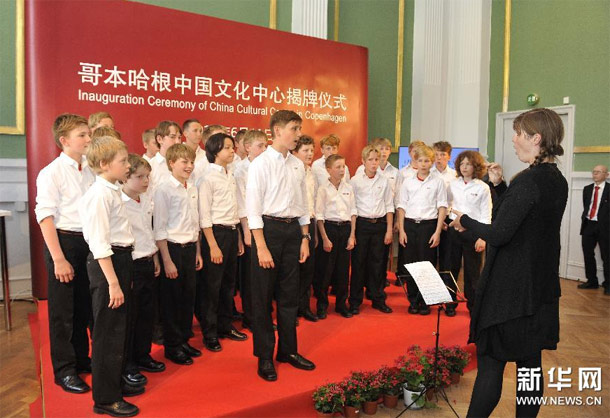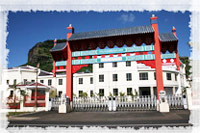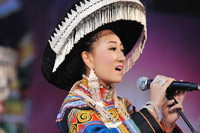 The Chinese Culture Center in Copenhagen was inaugurated on June 11, 2014. [photo/xinhua]
The Chinese Culture Center in Copenhagen was inaugurated on June 11, 2014. [photo/xinhua]
Editor's note: This year, six overseas culture centers have been inaugurated. The 16th, the Chinese Culture Center in Copenhagen , was officially launched a few days ago. In late June, President Xi and the visiting Myanmar President Thein Sein witnessed the signing of a Memorandum of Understanding on mutual establishment of cultural centers between the two countries.
The development of Chinese Culture Center has entered the acceleration period, drawing great attention from the world. What challenges does the Chinese Culture Center face in the process of construction and development? What role does it play? How can cultural soft power be improved? To find out, reporter from People’s Daily recently interviewed Ding Wei, vice minister of the Ministry of Culture.
Reporter: We’ve noticed that Chinese Culture Center has promoted a series of intensive moves and activities. In your opinion, what rare opportunity does CCC face in its present development?
Ding Wei: Accelerating the establishment of cultural centers is a major initiative and an important means to improve China’s cultural soft power and its cross-cultural communication ability. The central leaders have always attached great importance to the construction of Chinese Culture Center. In recent years, the Party and State leaders have made over 40 visits to the cultural centers and the signing ceremonies of government documents. The Third Plenary Session of the 18th Central Committee of the the Chinese Communist Party (CCP) has raised new requirements for the construction and development of cultural centers and has upgraded it to the national strategy. In addition, Chinese people strongly wish to go global while foreigners also expect to learn about China. All of these have provided rare preconditions for the development of Chinese Culture Center.
Reporter: Could you briefly introduce the current situation of Chinese Culture Center?
Ding Wei: Since the first establishment of Chinese Culture Center in Mauritius and Benin in 1988, it has gone through three stages: the exploration stage (1988-2002), the “take off” stage (2002-2012), and the present high-speed development stage. According to the national plan for the overseas cultural centers (2012-2020) approved by the State Council, by 2020, we will have established 50 culture centers. That is to say, before then, we will establish an average of four to five centers every year. So we have entered the high-speed development stage.
During the five years from 2007 to 2013, over 10,000 activities were carried out in the 14 centers we put into operation in succession. The overall number of public people directly participating in the activities amounted to several million. Practice has shown that the Chinese Culture Center in service, as an important platform for the “going global” strategy of Chinese culture, has played an irreplaceable role in spreading Chinese culture, demonstrating its soft power and enhancing the international influence of Chinese culture.
Reporter: Compared with other international cultural communication agencies, what unique functions does Chinese Culture Center have?
Ding Wei: The establishment of Chinese Culture Center has become an important symbol of deepening the overall bilateral relations in international communications. Chinese Culture Center is oriented to the mainstream society of the host country. It covers all stratums, around functions of “cultural communication, teaching training, dialogue between ideas, and information service”, carrying out activities on a regular basis, extensively conducting exchanges, promoting and spreading Chinese culture in a comprehensive, balanced and sustainable manner, and providing stable platform for cultural exchanges. This unique advantage has changed the traditional situation of insufficient independent platforms and mostly short-term exchanges in promoting culture abroad, opening a new channel for the international cultural work.
In future, we will progressively build Chinese Culture Center that serves external work in every domestic industry and field, showing our achievements in all respects and our national image of civilization, democracy, openness and progress.
In particular, the “going global” strategy not only includes the promotion of exhibits and performance, but moreover that of the concept, idea and philosophy. Doing a good job in telling Chinese stories, spreading Chinese voices and interpreting Chinese characteristics and values means the real cultural soft power, as well as the important mission of Chinese Culture Center.
Reporter: In terms of strengthening international communication abilities, is there any measure in place?
Ding Wei: We will construct Chinese Culture Center in a more inclusive way with a friendly, genuine and open attitude, and tell Chinese stories in ways and languages that can be understood by the foreigners. While spreading the language, we will combine it with interesting features such as tai chi, martial arts, Chinese medicine health preserving, and gourmet cooking. As for spreading aesthetics, we will focus more on forms containing Chinese culture, such as Chinese painting and calligraphy. At the same time, we will pay more attention to the “human” role of cultural communication, and let culture “go abroad” with the participation of Chinese and foreign cultural celebrities.
Reporter: Can you talk about the prospects of Chinese Cultural Center?
Ding Wei: In the future, we will earnestly implement the spirit of the Third Plenary Session of the 18th Central Committee of the CCP, further innovate the work methods, adopt multi-mode ideas in the Chinese Culture Center development, and lead the local, society, folk, enterprise and foreign side to construct Chinese Culture Center to accomplish the planning target as scheduled. Besides, we will actively design and decide according to the conditions of different countries, value the optimization of content quality and layout while accelerating the development. At present, we are trying to cooperate with the municipalities of Shanghai and Tianjin to jointly construct Chinese Culture Center, by taking the advantages of the local human, physical and financial resources. And if this practice proves to be worth spreading, we will try to delegate power locally, expanding the partnership to prefecture-level cities.
Reporter: Does it mean that the construction of Chinese Culture Center will also explore social participation?
Ding Wei: Yes. According to the international experience, the construction of cultural centers passed through different stages of government leadership, government and society participation and community participation. The development of cultural stages has its rules and courses. Now China has developed into the second stage. We believe, with the development of every aspect in China, there will be more and more people involved in the construction of Chinese Culture Center and participating in the “going global” cultural strategy.
Based on the above, we also plan to globally launch the sub-brand of Chinese Culture Center, the Home of Chinese Culture, and explore the new modes of “government leadership, participation of all parties, independent application, reviewed awarding and independent operation.” We will establish permit standards and bring eligible built-up or proposed agencies for overseas culture promotion into the sub-brand, the Home of Chinese Culture, support it to be the base and experience platform of overseas communication of Chinese culture. We will strive to set up 30 Overseas Home of Chinese Culture by 2016.
Thus, beyond the seas, we will take Chinese Culture Center building as the primary series, the Home of Chinese Culture as the sub-series, and achieve the multi-mode development and scale effect on the establishment, registration and operation as soon as possible, and to bring the construction of Chinese Culture Centere into an all-round development stage. Therefore, the overseas communication of Chinese culture can become a national cause participated by all people.
Reporter: As for the development of Chinese Culture Center, what’s your next focus?
Ding Wei: We will focus on the area coverage, the ability to achieve goals and the promotion of Chinese Culture Center. First, we must guarantee the number of Chinese Culture Center abroad, so as to have enough power to cover them. Second, we must adopt effective ways in the operation, to display a real China to the world, which requires the construction of a talent team. Third, we must improve the quality of Chinese Culture Center, strengthen the dialogues and exchanges in the concept level and influence the world with Chinese culture and intellect.
I hope that, as we consciously value cultural soft power and a “going global” strategy, the Chinese Culture Center becomes the most direct cultural window to understand China for local people of all classes, as well as a bridge connecting them to China.
We Recommend:

|

|

|
| Chinese Culture Centers Abroad |
Chinese painting exhibition held in Atlanta, US |
Beauty contest held in Torch Festival of Yi ethnic group |
